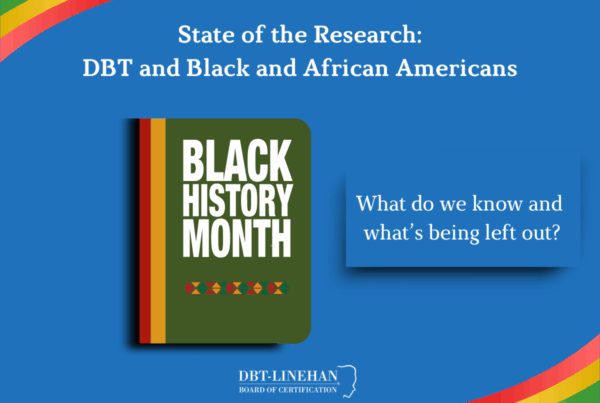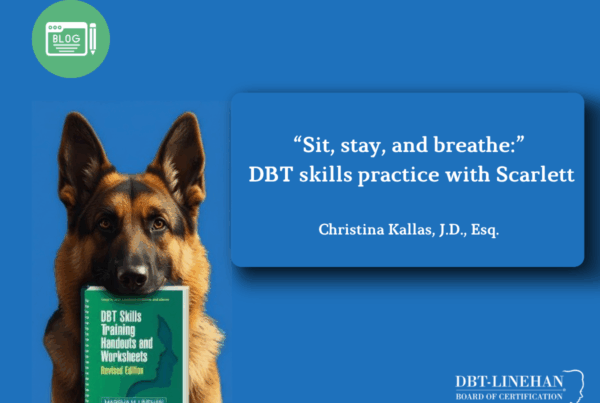Newsletter column by Public Member of the DBT LBC Board, Chris Kallas
When someone you love has a mental illness, or even emotional difficulties, you don’t think, “Where can I find someone to help him who has a PhD in clinical psychology, who has at least five years of experience in treating someone with this disorder, who works with clinicians who are similarly and appropriately trained in DBT, and who supervises at a mental health clinic, or who teaches at a major university?”
No, you think: “Where can I find someone to help him?” And then you think: “What kind of help does he need?”
You assume that your state has created requirements for a mental health professional: educational and experiential. So, you don’t need to research that. You call your insurance company, get a list of clinicians who take your insurance, and you start calling them. Or you ask your friends, or people you know in the field. Or you join an online support group dealing with BPD issues, and you ask them for recommendations.
Imagine my surprise when I discovered that people hold themselves out as ‘counselors’ without having a doctorate. Or even a degree in some kind of mental health field. Maybe they wrote a book (based on their own experience). Maybe they have a master’s degree – but it’s from the Julliard School, and that’s not disclosed on their website. Maybe they are a member of the Better Business Bureau. That’s nice, but not likely to help my loved one. Maybe they work as individual practitioners. How can they provide what I now know as ‘DBT’?
We live in New York City. Finding help for my loved one with BPD ought to be easy, no?
If you Google “DBT clinicians in New York City” you get lots of hits.
The first one is an ad for a DBT Online Course at: https://www.udemy.com/dbt-certificate
The Google listing says:
Enroll Today & Get 75% Off
Learn Dialectical Behavior Therapy (DBT) And How To Get Certified!
The pre-requirements for taking this course are:
An interest in counseling or psychology
A basic knowledge of what counseling or psychotherapy involves
An awareness that counseling has different approaches.
Okay, not appropriate if you are looking for a trained therapist today. So, let’s move on.
The next hit, www.dbtsolutions, is for a private practitioner who works, not with those diagnosed with BPD, but with those who want to boost their careers, who want to be “more authentic and effective”, and with university students, ‘emerging adults looking for a boost”. Not suitable for my loved one.
The next hit sounds more promising. The site: https://www.psychologytoday.com/us/therapists/dialectical-dbt/ny/new-york
is a list of those who provide DBT therapy in NY, put out by Psychology Today magazine. It’s not clear if the magazine vets the people on the list in any way. The providers can be sorted by insurance they take, issues they address, languages they speak, and in other ways. So, you can plow through this list, and call people you might want more information on. They have degrees ranging from Art Therapist to PhD. It would be a daunting task to go through them and find one to help. As I browsed through the list, none of them highlight that he or she has been certified.
And so on. The list of people offering “DBT Therapy” is very long. But what each of them means by “DBT Therapy” is not clear. And it’s certainly not obvious who has gone through rigorous training as Dr. Linehan designed the protocol.
Those of us who have gone down the rabbit hole looking for help for our loved ones know that this is the way the search goes. Alas, many of the family members I have worked with in Family Connections have sent their loved ones to some of these people. They think their loved ones are ‘getting DBT’. But it’s not clear to me what they are getting. Can an individual clinician give effective DBT therapy to a patient? The average family has no idea that DBT, as studied, has been developed in a setting where clinicians work together in a group.
From the family’s perspective, how much easier it would be if everyone were certified and had to keep up his or her certification over the years. From the clinician’s perspective, given how complex it can be to work with a client with BPD, how much better it would be to have a list available of those who are practicing adherent DBT, and if our insurance companies paid clinicians more because of their expertise. Those who were not certified could continue to practice; they just wouldn’t treat my loved one, with her complex emotional issues.
I hope to see this result in my lifetime.





